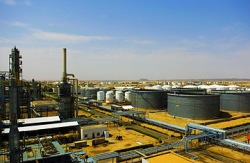Sudan says YTD revenue ‘barely’ covers oil production costs
February 11, 2009 (KHARTOUM) — A Sudanese finance official painted a bleak picture of the country’s fiscal health and called for increased dependency on agriculture.

“We are now in February and not a single dollar has been received by treasury” Abu-Gnaya said.
“We barely covered [our expenses] for the first quarter in the budget. We still had to borrow from the banks” he added.
Sudan’s 2009 budget has forecasted revenue based on $50 per barrel. However oil prices plunged since July 2008 from a high of $147 to a low of $36 today.
Oil exports represent 65% of revenue for Sudan and helped fuel its unprecedented economic growth despite US economic sanctions.
The Sudanese official said that government expenditure will shrink by 50% and that allocated funds for other projects will be reduced by 30% which according to him will prompt “prioritization” to avoid going over the budgeted amounts.
Abu-Gnaya proposed a number of options to deal with the revenue shortfalls including boosting the productivity of oil fields or drawing from the excess funds from last year that accumulated as a result of rising crude prices.
The Central Bank governor told the daily Al-Sharq Al-Awsat in an interview that the Government of Southern Sudan (GoSS) will be hit the most by the financial crisis because they are “solely dependent” on oil revenue.
Sudan’s state oil firm (Sudapet) has faced trouble finding acceptable bids for its crude on the world market which forced to cancel its last Nile Blend tender, for a January-loading cargo. Furthermore it skipped spot sales for February as it did for October & December.
Earlier this month the Sudanese finance and economy minister Awad Al-Jaz urged “all society’s organs” to work together to get past the current situation.
“The era of oil dependency is over” Al-Jaz said.
(ST)
